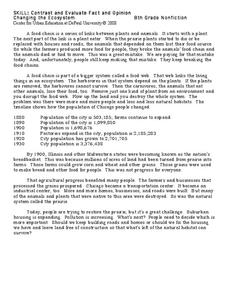Curated OER
The Living Environment
In this living environment worksheet, young scholars complete a crossword puzzle given 34 clues about the various species in the environment that produce, consume and decompose. Topics also include photosynthesis, respiration, glucose,...
Curated OER
How Do Plants and Animals Get Energy?
In this food chain worksheet, students will determine where plants and animals get their energy by filling in the blank of 4 statements.
Curated OER
Nutritional Relationships Chart
Producers, Herbivores, Carnivores, Decomposers, oh my! Help organize the intricacies between these four types of eaters with this biology instructional activity. Scientists display nutritional relationships in a graphic organizer. They...
Curated OER
Living it up with plants
Have kids in grades K-2 discuss how they know a tree is alive. The worksheet provides simplistic background information and an observation check list. They check off the ways that they can tell an oak tree is a living thing. Note: The...
Curated OER
Dinnertime for Animals
Is a deer an herbivore? What about a spider? Experiment with the food chain in an interactive science experiment. After listing the herbivores from a selection of animals, third and fourth graders compare the skulls and teeth of...
Curated OER
Science Quiz: Plants
In this science quiz: plants worksheet, learners answer 10 questions about botany trivia, then scroll down to check their answers.
Curated OER
Oddball Out: Plants and Animals
In this problem solving worksheet, learners analyze a row of pictures of various plants and animals to determine which creature is different from the others pictured.
Curated OER
Food chains and webs
Here is an extremely simplistic look at food chains and webs. It depicts three different food chains, each containing a plant, plant eater, and meat-eater. Learners fill in the missing part of each chain by using the images provided at...
Curated OER
Carnivore or Herbivore: Dinosaurs
In this science worksheet, young scholars examine 12 boxes, each with a different dinosaur, a species label and the letters C and H. Students circle the correct letter to note what each dinosaur eats- C for carnivore and H for herbivore.
Forest Foundation
The Web of Life
Producers, herbivores, carnivores, omnivores, decomposers. To begin a study of the forest ecosystem, learners examine the connections among the members of ecological communities.
Curated OER
Food Web II
Young ecologists are shown a picture of eight animals and two plants. On another piece of paper, they are asked to construct a food web that includes the animals pictured. They must also identify the producers, consumers, herbivores,...
Curated OER
Animal Feeding Strategies
How do different animals eat? This cross-curricular worksheet has biologists describing types of eaters and giving examples. Eight short-answer questions prompt learners to identify a carnivore, herbivore, omnivore, insectivore,...
Curated OER
Animals Word Search Puzzle
To make the classic word search more challenging and academic, this animal-terms puzzle has scholars solving clues to determine the words they find. Fifteen clues give detailed definitions of biology terms such as carnivore, reptile,...
Curated OER
Biodiversity
In this biodiversity worksheet, students sort and classify animals by their observable features using a dichotomous key. Students then respond to questions about complete and incomplete metamorphosis.
Curated OER
Food Chains, Food Webs, Biomass Pyramids and Cycle
In this food chains worksheet, students complete a crossword puzzle by placing 16 terms into the puzzle that match the clues given. Students review food webs, biomass pyramids, and the water cycle.
Kentucky School for the Deaf
Levels of Organization within an Ecosystem
From tiny organisms to entire biomes, young scientists examine the interdependent relationships tying all living and non-living things together with this collection of ecology resources.
Shelby County Schools
How Ecosystems Work
How does one organism get its energy? What is the main source of energy in an ecosystem? How does the flow of energy affect different types of ecosystems? Answer these questions with a fill-in-the-blank worksheet.
Curated OER
Mammals: Teeth and Diet
In this mammals' teeth and diet worksheet, students read for information, identify kinds of teeth, and sort animals into categories. In this fill in the blank and T-Chart worksheet, students write multiple answers for two questions.
Curated OER
Mammal Characteristics
In this mammal characteristics, students study diagrams to compare the different types of teeth found in herbivores and carnivores. This worksheet has 1 short answer and 2 multiple choice questions.
K12 Reader
What’s Eating You?
Introduce your class to producers, consumers, and pollinators with a reading passage. Class members read the text and respond to five related questions.
DePaul University
Contrast and Evaluate Fact and Opinion
How can you tell when an author is expression an opinion or stating a fact? Use two short reading selections to emphasize the difference between a statement that you can prove and one that you can't. The first passage explains food...
Curated OER
Dinosaur Crossword
In this solving a crossword puzzle about dinosaur worksheet, students read clues across and down, use the words in the word bank, and complete the puzzle. Students write 23 words.
K12 Reader
Antonym Animals
What's the antonym for wild? What's the opposite of young? Young readers identify the antonyms in a series of ten sentences. Next, they jot down the word pairs to reinforce the relationship between each set of antonym.
Read Theory
Analogies 2 (Level 7)
Determining the relationships between words is the purpose of this analogy instructional activity. Learners puzzle through 10 different analogies by using bridge sentences and types to determine which pairs of words share the same...
Other popular searches
- Endangered Carnivorous Plants
- Carnivorous Plants Lesson
- Growing Carnivorous Plants
- Plants Carnivorous























